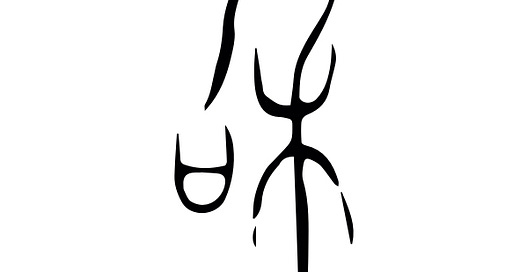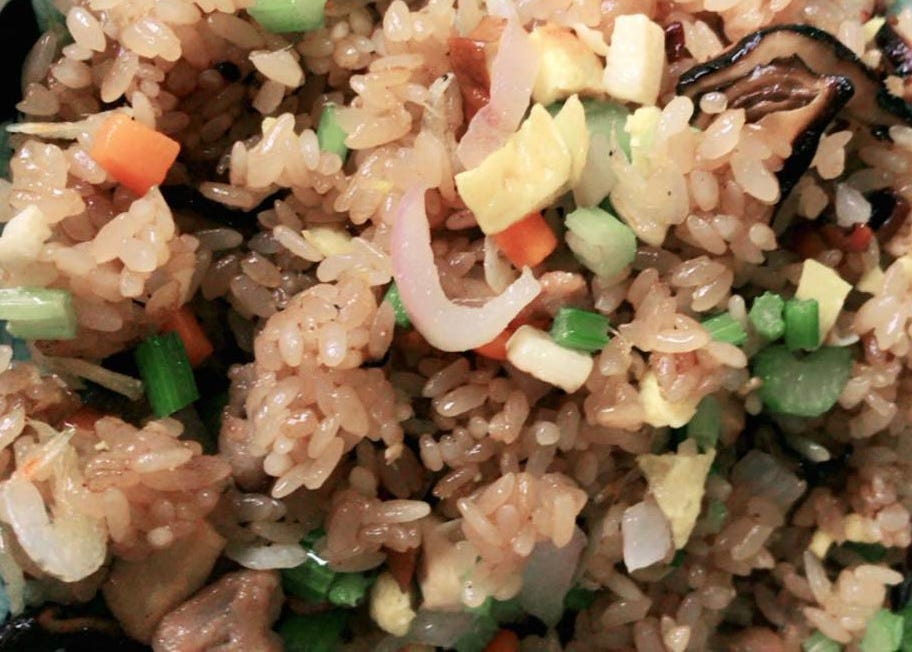TianDiBuJiaoPi JunZiYiJianDeBiNan BuKeRongYiLu
天地不交否 君子以儉德辟難 不可榮以祿
Under the sky the earth is resting, and there is no energy exchange between them - this is the natural image of Pi. When you feel that you are not able to perform to your best abilities, learn from this hexagram by understanding that now is the time to break free from your old patterns of behavior. To do so, we preserve our energies by holding ourselves back, making space for a different perspective to crystalize and thus offer you a chance to move through the obstacle by working out a new approach to this aspect of your life.
— DaXiang 大象
In my previous article, I discussed hexagram ䷋/ Pi 否, including its symbolic meanings and my interpretation of its associated DaXiang wisdom (quoted above), in order to explain why this hexagram depicts a pattern of disharmony or bad luck. It is no surprise to me that the imagery of Pi reflects the current global situation perfectly. In actuality, most of us, from all everywhere in the world, have collectively been living in a “Pi condition” for the last 2 years or more.
Right after I published my previous article, I was scheduled to teach my upcoming weekly class, and I realized that in the current chaotic living circumstances that come with being in the middle of a big move and seemingly endless renovation project, it had not registered that I had not shaved my face for several days. I have been living out of a backpack, but now that it was time to shave, oops, there was no soap around except the liquid dishwashing soap in the bathroom of our new apartment (we are kitchen-less for another month or more). Oh well, I could just use the dish soap! For the first time in my life, I used dish soap to shave my face. I was very pleased with my small ingenuity, a seemingly insignificant Pi situation requiring a little flexibility and a new way of thinking in order to move through what could have become a minor frustration.
I have encountered many Pi times in my life, such as being without food during my childhood, being chronically ill throughout my childhood and teen years, several near-death accidents, suffering the loss of dearly beloved ones, etc. I was planning to share some of these personal Pi stories within this article, and then I realized that there is no need for me to add more heavy stories to the current heightened state of suffering in the world. Instead, as my writing unfolded, I decided that I would rather share a little story and my thoughts about a lighter topic -- food.
Dreaming of Food
My mother just made my favorite dish, salty rice, an old fishing village traditional meal, composed of rice cooked with salt, vegetables, peanuts, and pork. I am so hungry for it because we have only eaten plain rice porridge, three meals a day, for over a week. As I am going to take my first delicious bite from the octagon shaped ceramic bowl, I notice that there is a piece of bitter flavored green leaf in my bowl, which I do not like. Almost instantly, I grow furious with my mother for not taking out this green leaf, and I start shouting …
I woke up from the intensity of my dream anger. Oh no, I missed the pleasure of eating this delicious meal! I felt that my body was still lying on the thin straw mat on the wooden floor. The whole thing had just been a dream! However, as the circumstances of the dream were still true, I was actually craving this delicious meal after a week of eating only plain rice porridge. I felt regret that even in my dream I did not get to enjoy one little bite of my dream meal...
In the 1970s, I had many such dreams about food. During that time period, people were required to have a government-controlled coupon in order to buy a very specific amount rice, and there was never enough rice to feed the whole family. Like most of the other families in my village, for much of the time we had only plain rice porridge for the bulk of our meals, three meals a day, and one “dry rice” (what you would think of as regular cooked rice, when you use only enough cooking water that it can be completely absorbed by the rice grains) one time per week, as a very special treat. I still remember the excitement of eating “dry rice” rather than the watery porridge! During that time period, having salty rice was definitely a rare luxury.
However, I was very lucky in that my family and I lived in a fishing village, which meant that we got to supplement our rice porridge with fish and seafood, and we often had vegetables, grown locally or from my mother’s own garden plot, as well. I was lucky enough with this opportunity for variety that I was known as a picky eater who would not eat bitter vegetables, and always got the best servings of fish and meat from my mother. Many families in the neighboring farming villages often lacked for food, and it was quite common that they would hike several hours a day to catch us at lunch time in order to beg for food. It was customary that the families in my village would give away a scoop of the food we had in our pots to those less fortunate than us.
At that time, I was happy to help my family to make some extra money. I would sell peeled sugar cane and salted peaches in the market, break up large stones into gravel for builders, and so on. Also, I remember how fun it was for my friends and I to go hunting for “treasures” in the garbage, sometimes lucky enough to find something valuable enough that we could exchange it for some homemade candy.
Dry Rice
Life changed a lot for me when I was chosen to attend the best high school in my county and awarded free boarding in the early 1980s. During these three years in boarding school, I got to upgrade my meals to “dry rice” for three meals a day. Each week, I would walk about 15 minutes to a special store in order to buy 7.5kg (16.5 pounds) of rice with my government coupon and then carry it on my shoulders, back to the 11 other people who shared my dorm room of about 15 square meters. My roommates and I would each take out one serving of our rice, put it in an aluminum box with our name on it, and place it on the school’s big steam rack in enough time to be ready for the next meal. Although better than the monotony of plain rice porridge, it is hard to eat plain dry rice three times a day! If we could afford it, we could spend 2 cents to buy a soy sauce broth for our breakfast rice and 5 cents for cabbage and tofu soup for our lunch and dinner rice meals.
I longed for winter break. After almost five months in school, my mother would prepare salty rice as my welcome home dinner. During that first homecoming, I remember taking my first delicious bite and that my mother, noticing that she had forgotten to pick out the bitter vegetable from my bowl, reached with her chopsticks to remove the bitter vegetables. After 5 months of dry rice and tofu cabbage soup, I stopped her immediately! I knew now that I could eat and appreciate all foods. From that point on, I have no longer been the picky eater I had been as a young child, and have had an “international stomach” - I enjoy all variety of the local foods offered to me during all of my teaching and traveling adventures.
Food and Peace
It is a natural phenomenon that being hungry can lead us to feeling angry. It was not just an occasional random thing that appeared in a childhood dream! In fact, in 2018, the word “hangry” was even adopted into the Oxford English Dictionary. Interestingly, the Chinese word, He 和, for peace and harmony, is made up of the radical He 禾 for rice and Kou 口 for mouth. Peace and harmony is a depiction of a person having food. In other words, enjoying what you have now is the way of peace.
Of course, it is hard to keep your peace if you have had no food for your mouth when your belly aches from hunger, and you might easily feel your anger rising. This anger could lead to aggression if you do not know how to manage your anger. It is not hard to understand that in the old days, the main reason for war was for control over food supplies.
The Chinese word for food does not merely mean food for eating, especially in the modern context. The word for food is also a symbol for sex, resource, power, desire, addiction, etc. If we hunger for something and can not get what we need or want, we may become angry, and this anger feeling may to lead to acts of aggression. However, the reality of life is that most the time, we are not able to get everything what we want nor even need.
To find our peace, we must learn how to live with this reality. The traditional Chinese wisdom for a harmonious life is ZhiZuChangLe 知足常樂 – Know where are your feet are and you will be happy. In other words, you can be happy if you know how to live with and be happy with what you have. In the old days, a master would require new disciples to go and beg for their meals for at least 3 months in order to help them understand this wisdom for happiness, peace, and harmony.
Why did they do this? Through the process of begging for food, one has to “lower ones self,” to figure out how to transform anger, ego, desire, hatred, and greed in order to become a graceful beggar, peaceful person, and practiced spiritual cultivator.
PiJiTaiLai 否極泰來
We have the expression PiJiTaiLai from Yijing wisdom. As discussed in the previous article, Pi is the hexagram for bad luck or obstacles; Ji means the extreme, the limitation, or the end; Tai is also one of the Tidal Hexagrams and is the opposite of Pi, meaning good luck, flow, balance, great peace, or harmony; Lai means come or arrive. Together, PiJiTaiTaiLai means once you are in an extremely bad situation, the good luck or harmony is coming to you. We often apply this wisdom when facing very bad circumstances in order to uplift ourselves (or others) up.
I am not sure the world has reached the end of Pi yet. My heart and prayers are long with those who are suffering, from the current war in Ukraine, all things Covid related, acute or chronic health issues, loss and heartache, or any number of other Pi situations. I wish that period of Tai is soon coming to all of us throughout the world. May we all live with the knowledge that we carry the power of Tai within as we wait for it to manifest outwardly in the world.






This is such a great exploration on 否, hunger, cessation of desire, etc. Thank you.
Master Wu, your wisdom is a powerful blessing at this time. Unceasing gratitude.